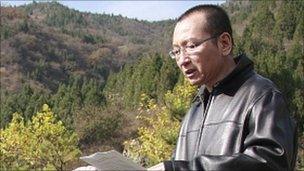Wife 'visits jailed Chinese Nobel winner Liu Xiaobo'
- Published

Liu Xiaobo was jailed for 11 years in December 2009
The wife of jailed Nobel prize-winning dissident Liu Xiaobo has reportedly been allowed to meet her husband.
Liu Xia said her husband wept during their prison meeting, dedicating his Nobel Peace Prize to the "martyrs" of Tiananmen Square in 1989.
Rights groups say Mrs Liu has not been allowed to leave her Beijing home since visiting her husband.
China reacted angrily to the decision to honour Mr Liu, calling him a criminal and protesting to Norway.
Beijing said relations with Norway, where the Nobel prize committee is based, could be under threat by the award. It summoned the Norwegian ambassador to hear a formal protest.
Armed guards
A US human rights group, Freedom Now, said Liu Xia visited her husband in jail on Sunday.
Freedom Now said Mr Liu wept during his wife's visit and dedicated his award to those killed at Tiananmen Square.
Mrs Liu also posted a message on Twitter with some details of their visit.
Liu Xiaobo's wife talks to the BBC about visiting her husband
Prison officials told Mr Liu that he had won the Nobel prize on the night of 9 October, she said on Twitter.
In the message, she also confirmed that she had been placed under what she described as "house arrest" since the announcement of her husband's award on 8 October.
"My mobile phone has been ruined; I have no way of making or receiving calls," she wrote.
The BBC Chinese service said Mrs Liu had been able to speak on her mobile phone for only two sentences after returning to Beijing before the line was blocked.
Armed guards are also reportedly on duty outside her home.
In a statement, Freedom Now said, external Mrs Liu was under "enormous pressure".
"We hope that world leaders will immediately condemn this shameful act by the Chinese government and urge Liu Xia's immediate and unconditional release," said Dr Yang Jianli, who Freedom Now said was a member of a legal team representing Liu Xiaobo.
Mr Liu was awarded the Nobel Peace Prize for his long years of activism in China.
He was a key figure in the Tiananmen Square protests in 1989, and in 2009 received an 11-year sentence for "inciting subversion".
His latest crime was to be involved in drafting Charter 08 - a document which called for multi-party democracy and respect for human rights in China.
- Published8 October 2010
- Published8 October 2010
- Published9 December 2010
- Published8 October 2010
- Published8 October 2010